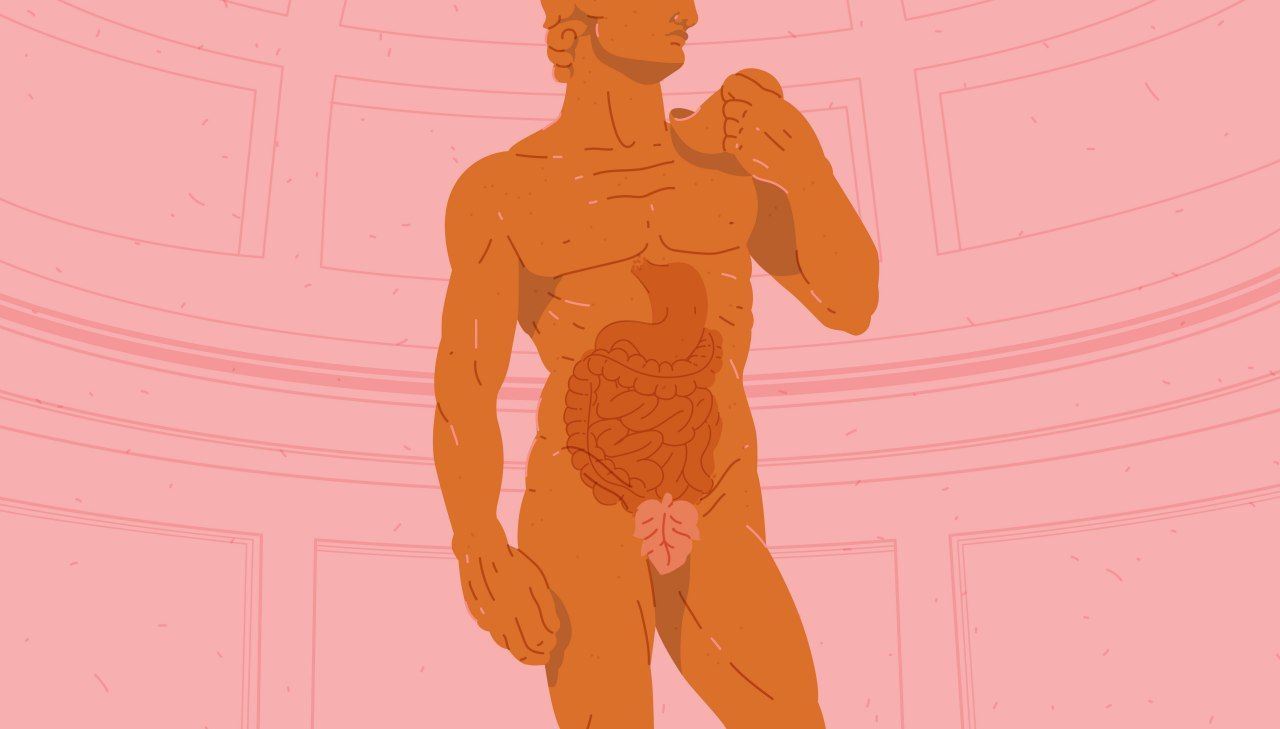Confused by Irritable Bowel Syndrome (IBS) and Inflammatory Bowel Disease (IBD)? Don’t worry, we’ve got you covered with this handy guide.
These two very similar acronyms stand for two very different conditions that affect the digestive tract. This article will teach you how to distinguish IBS from IBD, reviewing risk factors, symptoms and even how the gut microbiome is affected.
Syndrome vs. disease
IBS
In IBS, -S stands for syndrome. In medical terminology, a syndrome is a collection of symptoms occurring together that characterise a particular condition. Often, there is no identifiable cause and this is the case for irritable bowel syndrome.
However, it has been suggested that rates may be higher in men, but they are simply less likely to consult a doctor about it.
IBD
In IBD, -D stand for disease. A disease is a condition that prevents the body, or part of it, from functioning normally, and is usually distinguished by a collection of symptoms and signs. There are two subtypes of inflammatory bowel disease: Crohn's Disease and ulcerative colitis.
About 1 in every 420 people in the UK is affected by ulcerative colitis. That's about 146,000 British people living with it, compared to about 115,000 living with Crohn’s.
☝️TIP☝️ The Atlas Biomed DNA Test checks for genes associated with ulcerative colitis and Crohn’s. We combine these data with your personalised Health Survey to estimate your risk level for IBD.
Risk factors
IBS usually occurs in people from adolescence to their 40’s. Gastrointestinal infections, emotional trauma, antibiotics and some other drugs are also considered risk factors. It’s more common in women who are, incidentally, more susceptible to stress.
Photo by Kinga Cichewicz / Unsplash
Stress is not mental weakness. It is a physiological reaction to a perceived threat (conscious or subconscious) that activates the central stress response system in the body, called the hypothalamic-pituitary-adrenal axis (HPA axis for short).
Stress generates a cascade of chemical events, heightens the senses, redirects blood away from “non-essential” functions like reproductive and digestive organs, and modifies how sugar is managed when it reaches the bloodstream. It also triggers inflammation. That's why it's considered a risk factor for many chronic and preventable diseases in modern-day society.
IBD has several risk factors, including genetic predisposition and abnormal immune system reactions. Many health professionals suggest that these risk factors may be triggered by environmental and lifestyle factors, including previous gastrointestinal infections and the Western diet.
Ulcerative colitis risk factors
| AGE | People usually get diagnosed with ulcerative colitis around 30 years old, but it can emerge later, even after age 60 in some cases. |
| ETHNICITY | Most common in people of Ashkenazi Jewish heritage, followed by white populations of European descent. |
| FAMILY HISTORY | Higher risk for people with direct relatives (child, sibling, parent) suffering from ulcerative colitis |
Crohn’s risk factors
| AGE | People usually get Crohn’s when they’re young, and most diagnoses happen around 30 years old. |
| ETHNICITY | Most common in people of Ashkenazi Jewish heritage, followed by white populations of European descent, but also on the rise in black populations of North America and the UK. |
| FAMILY HISTORY | Higher risk for people with direct relatives (child, sibling, patient) suffering from Crohn’s. Up to 1 in 5 patients have a family member with the disease. |
| TOBACCO | Smoking is a significant risk factor, and considered the greatest manageable risk for Crohn’s. It is also linked to more severe onset and higher risk of surgery. |
| NSAIDs | Nonsteroidal anti-inflammatory medications include common off-the-shelf painkillers, like ibuprofen. They can cause inflammation of the gut lining that can worsen the condition. |
| EXTERNAL | Living in an urban area or industrialised country increases the risk of getting Crohn’s. Diets with highly-processed, refined and fried foods may play a role in getting this disease. |
Inflammation
Inflammation is a response by the body’s immune system to a detected threat. Nowadays, doctors and researchers like to distinguish two different ways inflammation can affect human health.
IBS: low-grade chronic inflammation
Not visible to the naked eye, but stimulated by factors like stress, poor diet and imbalanced gut microbial communities. Low-grade chronic inflammation is believed to play a role in many preventable diseases including obesity, diabetes type II and cardiovascular disease.
IBD: acute inflammation
Inflammatory bowel disease is now considered an autoimmune condition: the body’s immune system reacts abnormally to specific triggers (foods, stress episodes, smoking, alcohol, etc.).
This acute response takes the shape of inflammation that causes lesions to form on the affected organ. These lesions can evolve into open wounds, which is why bloody stools are considered a sign of IBD.
Photo by Nik Shuliahin / Unsplash
Triggers and symptoms
A significant difference between these conditions is in the symptoms. Two patients with IBS can experience it very differently, whereas a patient with Crohn’s or ulcerative colitis will have one prescriptive set of symptoms.
IBS
IBS symptoms can vary from patient to patient. Usually, a doctor should recommend specific diagnostic assessments to rule out other potential causes, and the patient must experience symptoms for at least 1 day per week for 3 months before a diagnosis of IBS can be made.
People with IBS are divided into 3 subcategories, depending on whether they get diarrhoea, constipation or both (mixed type).
| SYMPTOMS | Cramping |
| Abdominal pain | |
| Diarrhoea type | |
| Constipation type | |
| Mixed type |
It is not uncommon for patients with IBS to feel like their symptoms are brushed off lightly by doctors, but they can be serious enough to cause significant physical and emotional distress.
IBD
Crohn’s and ulcerative colitis symptoms have a lot in common, but they’re not identical.
| SHARED SYMPTOMS | Abdominal pain/cramping |
| Diarrhoea | |
| Bloody stools | |
| Fatigue | |
| Fever | |
| Weight loss |
Crohn's disease can affect any part of the digestive tract and lesions can appear anywhere from the mouth to the rectum. However, it is most commonly found in the small intestine.
| CROHN'S SYMPTOMS | Mouth sores |
| Loss of appetite | |
| Pain or leakage near anus (perianal fistula) |
This is a problem because the small intestine is responsible for absorbing the nutrients in your meals. Flares cause inflammation, and this is what prevents the small intestine from doing its job, putting patients at risk of deficiencies. In addition, the lesions can cause scar tissue that can have long-term consequences for digestive health.
Ulcerative colitis only affects the colon (large intestine), home to your gut microbes, and also the location where your body forms poop - and poop is an important indicator of how well you are digesting food.
| ULCERATIVE COLITIS SYMPTOMS | Blood/pus in diarrhoea |
| Rectal pain | |
| Rectal bleeding | |
| Urgent need to defecate | |
| Inability to defecate despite urgency | |
| Failure to thrive (in children) |
Several liters of water are flushed through a normal human colon every day. In fact, this process allows fibre in your stool to absorb hormones and toxins so they can be removed from the body. However, during an ulcerative colitis flare up, inflammation can prevent water from entering and exiting the colon normally, leading to loose watery stools.
IBS, IBD and the gut microbiome
Thanks to DNA sequencing technology, scientists are now able to study the gut microbiome, a large and essential ecosystem of mostly bacteria that reside in our gut. There is growing evidence that the composition of our gut bacteria influences health and disease, including IBS and IBD.
IBS
Interestingly, people with IBS-Diarrhoea or IBS-Mixed types may have lower levels of methane-producing bacteria in their gut. Research also indicates that they may have depleted populations of microbes that produce butyrate.
IBD
A lot of research has been conducted into the relationship between gut bacteria, ulcerative colitis and Crohn’s. It has identified a number of factors, including the elevated presence of pathogenic microbes like E. coli, as well as previous gastrointestinal infections as a precursor.
In fact, there’s so much evidence and research into this topic that we actually wrote a whole article about it. If you’re interested, just click on the link to your right.
Associated health risks
An important differentiation between IBS and IBD are the associated health risks. Both IBS and IBD can cause anxiety, depression and significantly reduce a person’s quality of life.
However, IBD is linked to serious complications and health risks including weak joints and bones, ulcers, Parkinson’s and colon cancer.
That is why it’s important to consult your doctor if you experience persistent digestive symptoms, especially if they include weight loss or bleeding. We know, it’s awkward talking about such topics because the gut is such a taboo organ, but that’s what doctors are for!
☝️Remember☝️
1. IBD leaves visible lesions in the gastrointestinal tract.
2. IBS is a collection of symptoms with no obvious cause.
3. Lifestyle factors and diet are involved in both these conditions.
4. Research links negative changes in the gut microbiome to IBS and IBD.
5. Anxiety and depression are common in people with these conditions.
6. IBD significantly increases serious disease risks, but IBS does not.
- Crohn’s and Colitis Foundation of America, IBD and IBS similarities and differences
- E. Sinagra et al., Inflammation in irritable bowel syndrome: Myth or new treatment target? 2016
- Q Ng et al., The role of inflammation in irritable bowel syndrome (IBS), 2016
- M. Pozuelo et al., Reduction of butyrate- and methane-producing microorganisms in patients with Irritable Bowel Syndrome, 2015
- L.Mancabelli et al., Unveiling the gut microbiota composition and functionality associated with constipation through metagenomic analyses, 2018





















